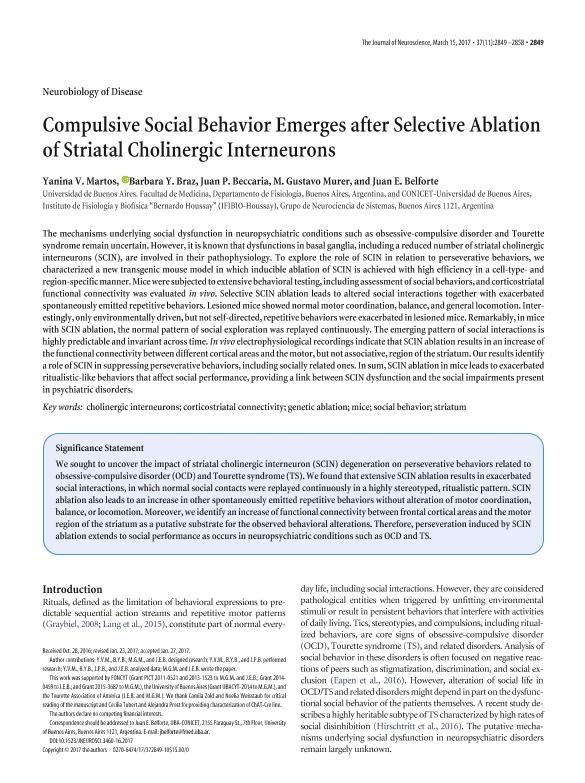Artículo
Compulsive Social Behavior Emerges after Selective Ablation of Striatal Cholinergic Interneurons
Martos Schott, Yanina Victoria ; Braz, Bárbara Yael
; Braz, Bárbara Yael ; Beccaria, Juan Pablo
; Beccaria, Juan Pablo ; Murer, Mario Gustavo
; Murer, Mario Gustavo ; Belforte, Juan Emilio
; Belforte, Juan Emilio
 ; Braz, Bárbara Yael
; Braz, Bárbara Yael ; Beccaria, Juan Pablo
; Beccaria, Juan Pablo ; Murer, Mario Gustavo
; Murer, Mario Gustavo ; Belforte, Juan Emilio
; Belforte, Juan Emilio
Fecha de publicación:
03/2017
Editorial:
Society for Neuroscience
Revista:
Journal of Neuroscience
ISSN:
0270-6474
Idioma:
Inglés
Tipo de recurso:
Artículo publicado
Clasificación temática:
Resumen
The mechanisms underlying social dysfunction in neuropsychiatric conditions like obsessive-compulsive disorder (OCD) and Tourette syndrome (TS) remain uncertain. Dysfunctions in basal ganglia, including reduced number of striatal cholinergic interneurons (SCIN), have been involved in their pathophysiology. To explore the role of SCIN in relation to perseverative behaviors we characterized a new transgenic mouse model in which inducible ablation of SCIN is achieved with high efficiency in a cell-type and region specific manner. Mice were subjected to an extensive behavioral testing including assessment of social behaviors and corticostriatal functional connectivity was evaluated in vivo. Selective SCIN ablation leads to altered social interactions together with exacerbated spontaneously emitted repetitive behaviors. Lesioned mice showed normal motor coordination, balance, and general locomotion. Interestingly, only environmentally-driven, but not self-directed, repetitive behaviors are exacerbated in lesioned mice. Remarkably, in mice with SCIN ablation the normal pattern of social exploration is continuously replayed. The emerging pattern of social interactions is highly predictable and invariant across time. In vivo electrophysiological recordings indicate that SCIN ablation results in an increase of the functional connectivity between different cortical areas and the motor, but not associative, region of the striatum. Our results identify a role of SCIN in suppressing perseverative behaviors including social related ones. In sum, SCIN ablation in mice leads to exacerbated ritualistic-like behaviors that impact on social performance providing a link between SCIN dysfunction and social impairments present in psychiatric disorders.
Archivos asociados
Licencia
Identificadores
Colecciones
Articulos(IFIBIO HOUSSAY)
Articulos de INSTITUTO DE FISIOLOGIA Y BIOFISICA BERNARDO HOUSSAY
Articulos de INSTITUTO DE FISIOLOGIA Y BIOFISICA BERNARDO HOUSSAY
Citación
Martos Schott, Yanina Victoria; Braz, Bárbara Yael; Beccaria, Juan Pablo; Murer, Mario Gustavo; Belforte, Juan Emilio; Compulsive Social Behavior Emerges after Selective Ablation of Striatal Cholinergic Interneurons; Society for Neuroscience; Journal of Neuroscience; 37; 11; 3-2017; 2849-2858
Compartir
Altmétricas



